Palestine, Iran Welcome Japan’s Offer to Mediate Middle East Tensions

“Japan can help in easing the ongoing tension between Iran and America…. As a goodwill gesture, America should either lift the unjust oil sanctions or extend the waivers or suspend them.”
Japan is willing to mediate the never-ending Israel-Palestinian conflict as an “honest broker” – a proposition Palestinians seemed to welcome, as Arab News reported in an interview with Japan’s Foreign Minister Taro Kono.
Prior to the interview, several Japanese delegates met with senior Palestinian officers and offered continued Japanese economic and political support. Japan is one of the main supporters of the Palestinian agricultural sector.
Kono added that maintaining stability in the Middle East region is one of Japan’s interests given the Asian nation relies heavily on Middle East oil. The minister condemned last June’s attacks on oil tankers in the Strait of Hormuz, one of which was Japanese-operated.
“Japan strongly condemns any attack on ships going through the Strait of Hormuz, and we strongly condemn Houthi attacks with missiles and drones on Saudi people and Saudi facilities,” Kono said.
Palestinians Welcome Japan’s Offer to Resolve the Conflict
Palestinian National Authority Prime Minister Mohammad Shtayyeh met a Japanese delegation, including Japan’s head of the diplomatic mission in Ramallah, Takeshi Okubo, and the Middle East envoy Masahiro Kono. Shtayyeh showed appreciation of the bilateral relationship between both countries, as a released statement said.
“Shtayyeh praised the continuous political and economic support from Japan, especially their support in the building of the institutions of the state of Palestine,” the statement concluded.
Saeb Erekat, the secretary of the executive committee of the PLO, also expressed appreciation of Japan’s support to Arab News.
“They (Japan) have invested in the development of institutions in Palestine and have kept a position against Israeli settlements.
“We welcome their position which is consistent with the peace plan presented by President Abbas before the Security Council in February 2018, calling for a group of countries to facilitate the peace process as we are not going to accept the United States to play this role,” Erekat said
Palestinian Disappointment in US Deal of the Century
Japan’s offer comes amid Palestinian disappointment over the U.S-backed peace proposal for Israel-Palestine, dubbed “The Deal of the Century,” which focuses on $50 billion to $60 billion financial aid to the Palestinians and other Middle East nations.
However, the proposal does not include any political solutions for Israel’s occupation and control in what Palestinians consider their region and the future status of Jerusalem.
Palestinian President Mahmoud Abbas stressed that the economic situation must not be addressed ahead of the political solution. “Money is important. The economy is important…. The political solution is more important,” Abbas said. Other senior Palestinian officials echoed Abbas’ statement, saying that the financial assistance would mean nothing if the occupation continues.
A Washington-sponsored Middle East peace proposal conference in Manama, Bahrain, at the end of June deepened Palestinian disappointment. Officials from the Palestinian territories were absent from the conference, and Palestinians held a nationwide protest against the conference, calling it a “workshop of shame.”
Can Japan Defuse the Ongoing Middle East Tension?
The already tense Middle East has grown more volatile due to worsening U.S.-Iran relations triggered by Washington’s withdrawal from the 2015 Iran Nuclear Deal also known as the JCPOA. Iran retaliated by increasing its uranium enrichment past the limit previously allowed in the pact.
During the visit of Japanese Prime Minister Shinzo Abe to Tehran last June, Iran asked Japan to ease the standoff with Washington since Tokyo is a staunch U.S. ally that also maintains a good relationship with Tehran.
“Japan can help in easing the ongoing tension between Iran and America… As a goodwill gesture, America should either lift the unjust oil sanctions or extend the waivers or suspend them,” a senior Iranian official said.
The U.S.’ brewing conflict with Iran could affect Japan too since the latter buys Iranian oil. Washington has plans to apply sanctions on countries that still buy Iranian oil.
As Michael Macarthur Bosack argued in an opinion piece for the Japan Times, Japan’s role as a mediator to resolve the ongoing tension in the oil-rich region is actually quite logical despite its lack of experience.
Perhaps most significantly, Japan showed a willingness to separate itself from U.S. influence and stand on its own when it issued the pro-Arab, pro-Palestinian Nikaido statement in 1973 during the first oil crisis. The statement recognized the legitimacy of the Palestinian state and called for Israeli restraint.
The presence of a neutral country mediating the region could also provide a fresh take on the Israel-Palestinian peace process. However, Abe will be tested whether he can balance the interests of the U.S. and Iran and the Palestinians, which can be tricky, and could perhaps sacrifice Japan’s ties with Washington.
Prime Minister Abe is expected to head to Southwest Asia next week to mediate relations between the U.S. and Iran, where there is a good chance he will prioritize Japans close ties with the U.S.















